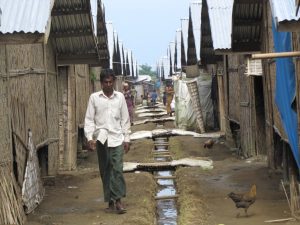A leading international rights group has accused Myanmar’s government of running an “apartheid” regime for Rohingya Muslims and other minorities in the country’s west, even as more than 700,000 Rohingya languish in refugee camps in Bangladesh.
In a report released on October 8, the U.S.-based Human Rights Watch (HRW) documents in harrowing detail the inhumane conditions that pertain at 24 camps and camp-like facilities near the Rakhine State capital Sittwe.
Here, the group alleges that some 130,000 Rohingya displaced civilians remain confined in “squalid and abusive” camps that it likens to “open-air detention facilities.” The camps also house several thousand Kaman Muslims from coastal parts of Rakhine.
The camps’ inhabitants have languished there since 2012, when they were driven from their homes during outbreaks of sectarian violence that saw Buddhist Rakhine mobs attack Muslim-dominated quarters with machetes, spears and petrol bombs. The outbreaks of violence, which took place in Sittwe and parts of central and south Rakhine State, came amid a targeted anti-Muslim hate campaign ginned up by Buddhist nationalist groups and encouraged by elements in the Myanmar military.
After the 2012 violence, the Rakhine State government set up the camps to house displaced Muslims in an ostensible effort to defuse tensions with the state’s Buddhist Rakhine population. But HRW claims that this temporary segregation has since evolved into a form of “arbitrary and indefinite detention” – one that amounts to a form of apartheid under international law.
The HRW report, which is based on dozens of interviews with Rohingya, Kaman Muslims, and humanitarian workers, documents in detail the difficulty of life in the camps. Many inhabitants suffer from malnutrition, massive health problems, a lack of education, no freedom of movement, and “victimization by a predatory network of security official checkpoints where extortion and abuse is common.” As one Rohingya man told HRW researchers, “The camp is not a livable place for us.”
The report also quotes one United Nations official describing a visit to the facilities: “Parts of the camps are literally cesspools,” the official said. “Shelters teeter on stilts above garbage and excrement. In one camp, the pond where people draw water from is separated by a low mud wall from the sewage.” Moreover, virtually none of these camps’ inhabitants will be permitted to vote at Myanmar’s national election on November 8.
Rohingya Muslims have faced discrimination and persecution by the Myanmar state for decades. The present government’s view is that the Rohingya are illegal immigrants from Bangladesh, even though some claim to have lived in the country for generations.
In August 2017, five years after the sectarian attacks that led to the creation of Rakhine’s archipelago of internal displacement camps, the Myanmar military launched a punishing “clearance operation” in northern Rakhine. Launched in nominal response to scattered attacks by Rohingya militants, the military and Rakhine vigilantes torched Rohingya villages, shot civilians and drove more than 700,000 Rohingya civilians across the border into Bangladesh.
The vicious assault, which U.N. experts have described as a possible act of genocide, has tanked Western perceptions of Myanmar and its leader Aung San Suu Kyi, who won international renown during her years of opposition to military rule.
“Aung San Suu Kyi’s government and the military have deliberately created and maintained oppressive camp conditions to render life unlivable for the Rohingya,” said HRW’s Asia researcher Shayna Bauchner, the author of the report. “The government’s claims that it’s not committing the gravest international crimes will ring hollow until it cuts the barbed wire and allows Rohingya to return to their homes, with full legal protections.”
While much international attention has focused on the people now languishing in refugee camps in Bangladesh, this report is timely in drawing attention to the situation faced by those that remain within the country. Whether the Myanmar government does anything to reverse its slow-motion genocide against the Muslims of Rakhine State remains to be seen.

































